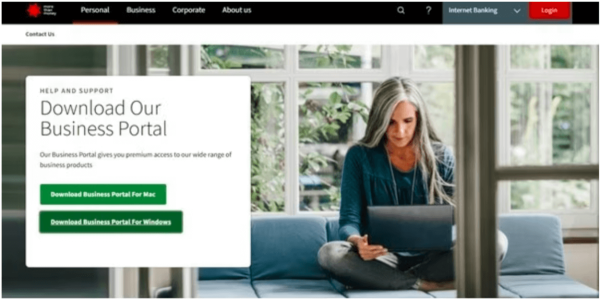Protect yourself from cyber criminals: NAB alerts you to a sneaky new scam
- Replies 5
In the digital age, being tech-savvy is no longer just an asset; it has become necessary. With the increasing prevalence of cybercrime, we must remain vigilant and safeguard ourselves against scammers.
At the Seniors Discount Club, we understand the significance of staying informed about the latest online safety advice. That’s why we want to bring your attention to a newly emerging cyber scam.
A major Australian bank, NAB, warned its customers after discovering that scammers were creating fake websites impersonating the bank.
According to NAB, the scammers created fake NAB-branded websites, such as NAB Connect for business banking, intending to mislead customers into downloading malicious software.

Unfortunately, there are already victims who have fallen prey to it. In this scheme, criminals have gone to great lengths to create impeccable replicas of bank websites.
These fake sites meticulously mimic the logos, graphics, and overall branding of the genuine financial institution, causing further distress to unsuspecting customers.
At first glance, the counterfeit website appears identical to the real one, with one notable exception—it harbours a dangerous element: malware.
Deceptively innocent prompts appear, urging users to download a seemingly harmless 'business portal' or engage in a 'live chat'. However, these actions couldn't be further from harmless.
Clicking on any of these links exposes you to the risk of downloading malicious software that grants control over your device. It is crucial to remember that regardless of how authentic a website may appear, it is imperative to exercise caution when asked to download software directly from a bank's website. It is best to stay away from such requests altogether.
'These links will download a remote access software for criminals to take control of customer devices,' NAB warned.
'Do not click anything on this page and close the window immediately.'
It's worth noting that NAB stated it would never ask customers to download programs directly from its site.
If you or someone you know suspects their bank account information might have been hacked, it is vital to take immediate action. You can contact NAB by calling 13 22 65 or visiting your nearest NAB branch. Don't delay, as a swift response is crucial in such situations.
According to the Australian Competition and Consumer Commission (ACCC), Australians experienced a staggering loss of $3.1 billion from scams in 2022, marking a massive 80 per cent increase from the previous year.
Among the various categories, investment scams emerged as the most detrimental, resulting in a total loss of $1.5 billion. Following closely behind were remote access scams, which inflicted a financial toll of $229 million on Australians.
ACCC Deputy Chair, Catriona Lowe, emphasised that the consequences of these losses extend beyond mere financial implications.
'Australians lost more money to scams than ever before in 2022, but the true cost of scams is much more than a dollar figure as they also cause emotional distress to victims, their families and businesses,' she said.
'As scammers become increasingly sophisticated in their tactics, it is clear a coordinated response across government, law enforcement, and the private sector is essential to combat scams more effectively.'

To further protect yourself from online scams, it's always a good idea to:
1. Keep your computer, smartphone, and tablet up-to-date with the latest security software.
2. Regularly change your passwords and use unique, complex ones for each account.
3. Be cautious when clicking links or opening email attachments, especially from unknown senders.
4. Enable multi-factor authentication wherever possible, adding an extra layer of security.
This serves as another reminder to prioritise your online safety. It's crucial to take preventive measures and remain vigilant.
We strongly recommend implementing every security measure available to you. It's important to regularly review your accounts for any signs of suspicious activity, no matter how minor it may seem. Even a small transaction could indicate that your account has been compromised.
Stay safe, everyone! Keep these tips in mind and be cautious while navigating the online world. Have you come across any suspicious websites lately? How do you ensure that you're browsing on safe and legitimate websites? Share your tips with us in the comments below!
At the Seniors Discount Club, we understand the significance of staying informed about the latest online safety advice. That’s why we want to bring your attention to a newly emerging cyber scam.
A major Australian bank, NAB, warned its customers after discovering that scammers were creating fake websites impersonating the bank.
According to NAB, the scammers created fake NAB-branded websites, such as NAB Connect for business banking, intending to mislead customers into downloading malicious software.

NAB is issuing a warning to its customers regarding scammers who are creating fake websites to impersonate the bank. Credit: NAB.
Unfortunately, there are already victims who have fallen prey to it. In this scheme, criminals have gone to great lengths to create impeccable replicas of bank websites.
These fake sites meticulously mimic the logos, graphics, and overall branding of the genuine financial institution, causing further distress to unsuspecting customers.
At first glance, the counterfeit website appears identical to the real one, with one notable exception—it harbours a dangerous element: malware.
Deceptively innocent prompts appear, urging users to download a seemingly harmless 'business portal' or engage in a 'live chat'. However, these actions couldn't be further from harmless.
Clicking on any of these links exposes you to the risk of downloading malicious software that grants control over your device. It is crucial to remember that regardless of how authentic a website may appear, it is imperative to exercise caution when asked to download software directly from a bank's website. It is best to stay away from such requests altogether.
'These links will download a remote access software for criminals to take control of customer devices,' NAB warned.
'Do not click anything on this page and close the window immediately.'
It's worth noting that NAB stated it would never ask customers to download programs directly from its site.
If you or someone you know suspects their bank account information might have been hacked, it is vital to take immediate action. You can contact NAB by calling 13 22 65 or visiting your nearest NAB branch. Don't delay, as a swift response is crucial in such situations.
According to the Australian Competition and Consumer Commission (ACCC), Australians experienced a staggering loss of $3.1 billion from scams in 2022, marking a massive 80 per cent increase from the previous year.
Among the various categories, investment scams emerged as the most detrimental, resulting in a total loss of $1.5 billion. Following closely behind were remote access scams, which inflicted a financial toll of $229 million on Australians.
ACCC Deputy Chair, Catriona Lowe, emphasised that the consequences of these losses extend beyond mere financial implications.
'Australians lost more money to scams than ever before in 2022, but the true cost of scams is much more than a dollar figure as they also cause emotional distress to victims, their families and businesses,' she said.
'As scammers become increasingly sophisticated in their tactics, it is clear a coordinated response across government, law enforcement, and the private sector is essential to combat scams more effectively.'
Key Takeaways
- NAB is warning customers about scammers creating fake websites impersonating the bank.
- The fake NAB-branded websites, such as NAB Connect for business banking, are designed to mislead customers into downloading malicious software.
- Customers are asked to download a 'Business Portal' or open a 'live chat' on these fake web pages, allowing criminals to control customer devices.
- NAB advises customers to avoid clicking anything on these pages and to close the window immediately, stating that they will never ask customers to download programs directly from their site.
To further protect yourself from online scams, it's always a good idea to:
1. Keep your computer, smartphone, and tablet up-to-date with the latest security software.
2. Regularly change your passwords and use unique, complex ones for each account.
3. Be cautious when clicking links or opening email attachments, especially from unknown senders.
4. Enable multi-factor authentication wherever possible, adding an extra layer of security.
This serves as another reminder to prioritise your online safety. It's crucial to take preventive measures and remain vigilant.
We strongly recommend implementing every security measure available to you. It's important to regularly review your accounts for any signs of suspicious activity, no matter how minor it may seem. Even a small transaction could indicate that your account has been compromised.
Stay safe, everyone! Keep these tips in mind and be cautious while navigating the online world. Have you come across any suspicious websites lately? How do you ensure that you're browsing on safe and legitimate websites? Share your tips with us in the comments below!







